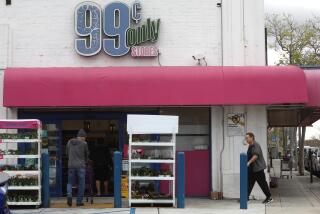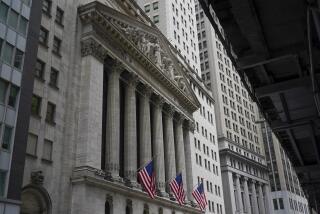Gulf Crisis Makes Going Public Hard to Do, Firms Find : Market: Most Orange County companies find stock selling at or below offering prices.
- Share via
IRVINE — When Advanced Logic Research Inc., a rising star in the high-end personal computer market, made its initial public offering of stock in April at $13 a share, investors quickly embraced the issue. By June, the stock hit $19.25.
But its staying power was soon tested. With Iraq’s invasion of Kuwait and the resulting oil price rise and growing recession fears, the world markets have tumbled. So has ALR’s stock price. It closed at $9.50 Tuesday, 27% below its issuing price and 51% below its yearly high.
ALR is not alone. Of the 126 companies this year making major initial public offerings--those seeking to raise more than $10 million--85 have seen their stock fall below the issuing price, according to IDD Information Services, a research firm.
“Right now, it’s a very punishing market for those IPOs that disappoint investors,” said Patrick Graham, managing director of the corporate finance department at Paine-Webber Inc. in Los Angeles.
While the crisis in the gulf has hurt all stocks, those of small, growth companies--particularly those with short track records--have been hurt more. And some analysts say even a quick settlement of the Iraqi crisis will not mean a fast recovery for companies that recently went public.
“We’re going to see some rocky times in the IPO market even if there’s a resolution in the Middle East crisis because as long as investors can’t see a clear path for our national fiscal and monetary policies, they’re not going to want to invest in IPOs,” Graham said.
Douglas Brengel, managing director in charge of IPOs at Salomon Bros. in Los Angeles, agreed. “Investors are looking for high liquidity in an environment of recessionary fears brought on by higher fuel costs,” he said. “They are looking for companies that have gone through a variety of economic cycles.”
Until the summer’s political and economic developments, the number of IPOs were running strong. There were 126 IPOs worth $8.17 billion during the first eight months of this year, compared to only 77 IPOs seeking a total of $8.18 billion in the same period last year, Brengel said.
But as of Tuesday, in Orange County alone, the stocks of six of the seven firms to go public in 1990 are trading at or below their offering prices. And for some, the stock price fall has come despite good financial performances.
For instance, Wet Seal Inc., the Irvine-based retailer of young women’s clothing, two weeks ago reported strong second-quarter earnings and an 18.6% increase in sales. But after an initial run-up in price from $14.25 a share to $18.25, the company’s stock fell to as low as $12.25. It closed at $14.25 Tuesday.
“We were warned by our investment bankers before we went public that the stock market often has a mind of its own and outside forces will influence our stock price,” said Wet Seal President Ken Chilvers.
The gulf crisis, in fact, has prompted a worldwide drop of stock prices, and revealed some weaknesses in the U.S. economy. In addition, it has shaken consumer confidence in the United States, worrying many retailers.
“Wet Seal stock has been caught in the general downturn of the market caused by the Middle East crisis jitters and not by the jitters in the retail market, where sales have been flat in general,” said Don Murray, a partner with the accounting firm of Deloitte & Touche, which helped take the retailer public.
Not only have companies going public this year suffered, but those that were preparing IPOs are now being forced to find new ways to raise capital.
Already, a number of underwriters said, several companies planning to go public in the fall are either re-evaluating the option or have shelved their IPO until market conditions improve.
“This isn’t a healthy sign for our economy,” said Jeffrey M. Schaefer, research director of the Securities Industry Assn. in New York. Limited funds available for IPOs suggest that the “dynamics of growing enterprises with innovation, new jobs and new technology have been slowed considerably,” he said.
Technology firms, once the darling of IPO investors, had a hard time bringing out new issues last year, and some investor nervousness has carried over to 1990, said Dominic Liuzzi, an analyst with Shearson Lehman Hutton in Newport Beach.
Investors in the last month, particularly institutional buyers who normally can be counted on to snap up 50% to 70% of IPOs, have not been receptive to new offerings, which often carry a high degree of speculation.
To restore some of IPOs’ appeal, companies must settle for lower stock prices, Brengel said.
Although the overall IPO market is tougher now, “a good company can still find a window of opportunity,” said Michael Ferron, senior manager of the emerging business services department at Deloitte & Touche in Costa Mesa.
Energy-related companies, as well as some retail and telecommunications firms that have found a niche for their products or services, have held up during the current market downturn, Brengel said.
For example, Santa Fe Energy Resources Inc., a Houston-based energy services company, saw its stock rise from $18.25 a share in March to $20.75 at Tuesday’s close. The stock price of Oakland-based Safeway Inc. rose from its IPO price of $11.25 a share in April to $14.
Still, the general market slump spells tough times for growing companies in need of cash. Problems among banks and savings and loans have prompted many institutions to tighten their credit guidelines and lending policies.
“Companies across the board are finding it more difficult to secure financing,” said Gary C. Naumann, director of the capital markets services group at Deloitte & Touche.
1990 IPO PERFORMANCE
Seven Orange County companies have had initial public offerings (IPOs) of their stock this year. While several experienced early stock run-ups, the general decline in the stock markets--prompted by the Persian Gulf crisis and recession fears--has adversely affected their share price. Of the seven, four are now trading lower than their issuing price, two have shown no change and one rose slightly.
Issue Issue Sept. 4 Yearly Company Business Date Price Close High TriCare Occupational Jan. 26 $6.50 $6.00 $9.25 health care I-Flow Home infusion Feb. 1 2.00 1.375 9.06 equipment Tokos Medical Home health March 26 12.00 11.625 16.50 care services Advanced Logic Microcomputer April 11 13.00 9.50 19.25 systems Research BE Avionics Airline April 23 7.00 7.25 10.75 entertainment systems Wet Seal Retail clothing July 3 14.25 14.25 19.00 GB Foods Fast-food Aug. 21 3.25 3.25 3.50 restaurants
Yearly Company Low TriCare $6.00 I-Flow 1.25 Tokos Medical 9.00 Advanced Logic 8.00 Research BE Avionics 6.75 Wet Seal 12.25 GB Foods 3.25
Source: IDD Information Services Inc. & Newport Securities Corp.
More to Read
Inside the business of entertainment
The Wide Shot brings you news, analysis and insights on everything from streaming wars to production — and what it all means for the future.
You may occasionally receive promotional content from the Los Angeles Times.










